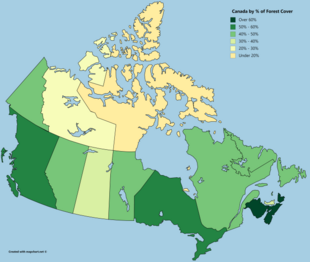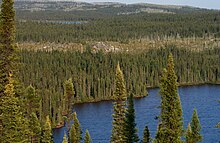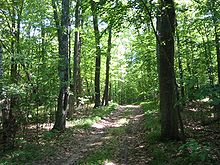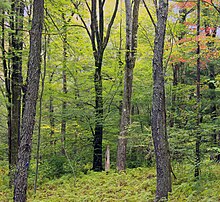
The forests of Canada are located across much of the country. Approximately half of Canada is covered by forest, totaling around 2.4 million km2 (0.93 million sq mi). [1] Over 90% of Canada's forests are owned by the public ( Crown land and Provincial forest). About half of the forests are allocated for logging.
Named forests are found within eight distinct regions. These forests may also be part of ecosystems, a number of which extend south into the United States. For example, the Northern hardwood forest is an ecosystem located in large areas of southeastern and south central Canada as well as in Ontario and Quebec. This system extends south to west and even into the United States.
Canada had a 2018 Forest Landscape Integrity Index mean score of 8.99/10, ranking it 11th globally out of 172 countries. [2]
Ontario alone, makes up for 20% of Canada's Forests, which makes roughly 2% of the forests in the world. [3] Ontario follows strict laws and regulations to manage its forests in a sustainable way. Ontario Forests are mainly managed by the Ministry of Northern Development, Mines, Natural Resources and Forestry (NDMNRF). [4] They ensure a fair trade between sustaining the forest, while protecting the biodiversity of the ecosystem and providing legal methods for harvesting to benefit the economy. [3]
Regions

The forests of Canada are located within eight regions: [5] [6]
- Acadian Forest Region - This region comprises a temperate broadleaf and mixed forest ecoregion located in Quebec as well as the Maritime Provinces in Eastern Canada, and extends into the United States. [7]
- Boreal Forest Region - This the largest forest region in Canada. It is located in the north and contains about one third of the world's circumpolar boreal forests.
- Coast Forest Region - Located on the west coast, this region almost entirely comprises coniferous trees including the Douglas-fir, Sitka spruce, western hemlock, and western red cedar.
- Columbia Forest Region - Also mostly comprising coniferous trees, this region is located between the Rocky Mountains and the central plateau in British Columbia.
- Deciduous Forest Region - This region is located between Lake Huron, Lake Ontario, and Lake Erie in southwestern Ontario. [8]
- Great Lakes-St. Lawrence Forest - This region is the second largest (the boreal being the largest), and is located from southeastern Manitoba to the Gaspé Peninsula. [8]
- Montane Forest Region - Located in the west of Canada, this region covers parts of the Kootenays, the central plateau of British Columbia, and a number of valleys close to Alberta's border. [8]
- Subalpine Forest Region - This region is located in British Columbia and Alberta. It covers the Rocky Mountains from the west coast to Alberta's uplands. [8]
By Province
The following is a list of forests, ecoregions, ecozones, forested parklands and provincial parks.
Alberta

- Alberta Mountain forests
- Alberta-British Columbia foothills forests
- Aspen parkland
- Mid-Continental Canadian forests
- Muskwa-Slave Lake forests
- North Central Rockies forest
British Columbia

- Alberta-British Columbia foothills forests
- Aspen parkland
- British Columbia mainland coastal forests
- Cascade Mountains leeward forests
- Elkington Forest
- Fraser Plateau and Basin complex
- Great Bear Rainforest
- Inland rainforest
- Lower Mainland Ecoregion
- Malcolm Knapp Research Forest
- Muskwa-Slave Lake forests
- North Central Rockies forest
- Northern Pacific coastal forests
- Pacific temperate rainforests
Manitoba
- Agassiz Provincial Forest
- Belair Provincial Forest
- Brightstone Sand Hill Provincial Forest
- Cat Hills Provincial Forest
- Cormorant Provincial Forest
- Duck Mountain Provincial Forest
- Mid-Continental Canadian forests

- Midwestern Canadian Shield forests
- Moose Creek Provincial Forest
- Northwest Angle Provincial Forest
- Porcupine Provincial Forest
- Provincial forests
- Sandilands Provincial Forest
- Spruce Woods Provincial Forest
- Swan-Pelican Provincial Forest
- Tallgrass Aspen Parkland
- Turtle Mountain Provincial Forest
- Wampum Provincial Forest
- Whiteshell Provincial Forest
Newfoundland
Nova Scotia
Ontario

- Barker's Bush
- Carolinian forest
- Central Canadian Shield forests
- Crothers Woods
- Eastern Great Lakes lowland forests
- Ganaraska Region
- Haliburton Forest
- Happy Valley Forest
- John E. Pearce Provincial Park
- Larose Forest
- Laurentian Mixed Forest Province
- Long Point, Ontario
- Midwestern Canadian Shield forests
- Mixed Wood Plains Ecozone (CEC)
- Niagara Glen Nature Reserve
- Obabika Old-Growth Forest
- Pinery Provincial Park
- Point Pelee National Park
- Rock Glen Conservation Area
- Rock Point Provincial Park
- Rondeau Provincial Park
- Short Hills Provincial Park
- Southwest Elgin Forest Complex
- Western Great Lakes forests
- Wheatley Provincial Park
Prince Edward Island
Quebec

- Angell Woods
- Bois Beckett Forest
- Central Canadian Shield forests
- Eastern Canadian forests
- Eastern Canadian Shield taiga
- Eastern Great Lakes lowland forests
- Great North Woods
- Laurentian Mixed Forest Province
- Mixed Wood Plains Ecozone (CEC)
Saskatchewan

- Canwood Provincial Forest
- Fort à la Corne Provincial Forest
- Nisbet Provincial Forest
- Northern Provincial Forest
- Porcupine Provincial Forest
- Torch River Provincial Forest
Yukon
Other forest areas

Temperate broadleaf and mixed forests
- Beech-maple forest - This forest is located mostly in eastern United States and extends into southern Canada. [10]
- Carolinian forest
- Eastern forest-boreal transition
- Eastern Great Lakes lowland forests
- John E. Pearce Provincial Park
- Long Point, Ontario
- Niagara Glen Nature Reserve
- Northern hardwood forest
- Pinery Provincial Park
- Point Pelee National Park
- Rock Point Provincial Park
- Rondeau Provincial Park
- Short Hills Provincial Park
- Southwest Elgin Forest Complex
- Western Great Lakes forests
- Wheatley Provincial Park
See also
References
- ^ "Total forest coverage by country". the Guardian. 2 September 2009. Retrieved 23 September 2018.
- ^ Grantham, H. S.; Duncan, A.; Evans, T. D.; Jones, K. R.; Beyer, H. L.; Schuster, R.; Walston, J.; Ray, J. C.; Robinson, J. G.; Callow, M.; Clements, T.; Costa, H. M.; DeGemmis, A.; Elsen, P. R.; Ervin, J.; Franco, P.; Goldman, E.; Goetz, S.; Hansen, A.; Hofsvang, E.; Jantz, P.; Jupiter, S.; Kang, A.; Langhammer, P.; Laurance, W. F.; Lieberman, S.; Linkie, M.; Malhi, Y.; Maxwell, S.; Mendez, M.; Mittermeier, R.; Murray, N. J.; Possingham, H.; Radachowsky, J.; Saatchi, S.; Samper, C.; Silverman, J.; Shapiro, A.; Strassburg, B.; Stevens, T.; Stokes, E.; Taylor, R.; Tear, T.; Tizard, R.; Venter, O.; Visconti, P.; Wang, S.; Watson, J. E. M. (2020). "Anthropogenic modification of forests means only 40% of remaining forests have high ecosystem integrity - Supplementary Material". Nature Communications. 11 (1): 5978. doi: 10.1038/s41467-020-19493-3. ISSN 2041-1723. PMC 7723057. PMID 33293507.
- ^ a b "State of Ontario's Natural Resources - Forest 2021".
- ^ "Ministry of Northern Development, Mines, Natural Resources and Forestry".
- ^ "Forest classification". Natural Resources Canada. 14 June 2017. Retrieved 24 September 2018.
- ^ "Forest Regions - The Canadian Encyclopedia". www.thecanadianencyclopedia.ca.
- ^ "New England/Acadian Forests". www.cas.vanderbilt.edu.
- ^ a b c d "Canada's Forests - Sustainability and Management - CCFM". www.sfmcanada.org.
- ^ "Natural Areas". 11 January 2018.
- ^ "Eco Succession". Archived from the original on 2008-12-26. Retrieved 2018-09-23.
External links
-
 Media related to
Forests in Canada at Wikimedia Commons
Media related to
Forests in Canada at Wikimedia Commons
